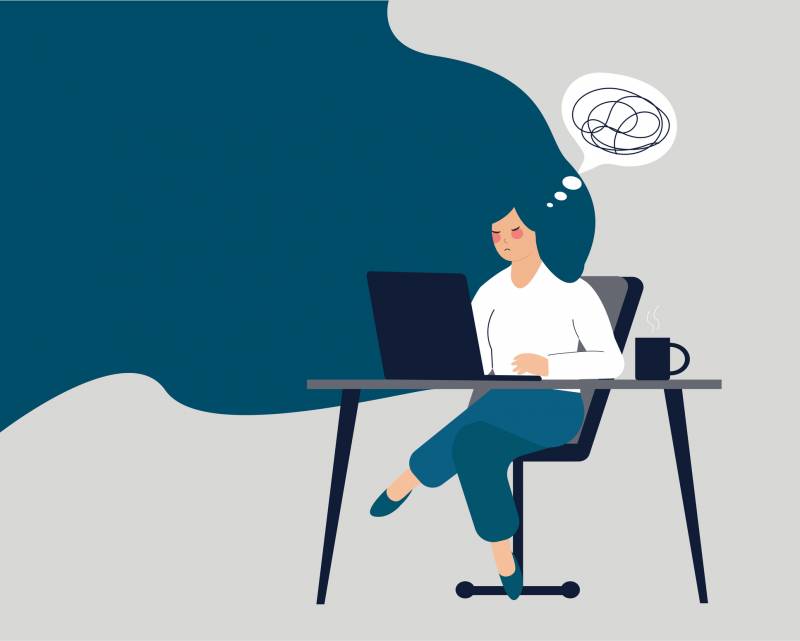In late October, at the suggestion of a colleague, she reached out to Phoenix Union’s wellness specialists. One of them, Cailene Pisciotta, responded “super quickly” and the pair scheduled an appointment for the end of a school day.
From the start of the school year through mid-March, Collins-Frazier and Pisciotta met with 208 teachers, administrators and staff members for a total of 438 individual counseling sessions, typically lasting an hour. They’d seen staff at every one of Phoenix Union’s 21 school sites.
The counselors said the most common reasons that employees contacted them were grief, depression, anxiety, challenges with some student behaviors and fatigue from the uncertainties wrought by COVID-19. When asked how they respond to those stressors, Collins-Frazier and Pisciotta replied in unison: “validation.” Teaching during a pandemic is scary. It’s overwhelming. And teachers need to hear that acknowledged “because what they’re going through is so real,” Pisciotta said.
The teacher I spoke with said she first contacted the counselors because of marital challenges but ended up talking about tension caused by differences in classroom management styles between her and her co-teacher. Pisciotta helped her practice articulating her feelings with “I” statements, which led to a three-hour conversation between the two teachers about how to better support each other.
“I think now we’re connecting more in every way, like personally and professionally,” she said after her meetings with Pisciotta. “And that tension has started to go down, which has been a sigh of relief now because now I feel better about coming to work.”
In addition to individual sessions, the wellness specialists lead workshops on self-care practices, such as mindfulness. What they don’t do is crisis intervention or long-term treatment. If an employee needs more support after a few sessions, Collins-Frazier and Pisciotta refer them to an external provider. They’ve done a lot of outreach to find providers who can accept new clients and the district’s insurance, which can make a big difference when long wait times for mental health services are the norm.
“We are building a little network of people that are willing to jump in and help,” said Collins-Frazier.
“Let’s start loving our people”
Collins-Frazier and Pisciotta were hired in a time of heightened need for mental health support because of coronavirus, but the idea for their positions originated earlier, according to Phoenix Union Superintendent Chad Gestson. “We had an initial discussion right before the pandemic about, you know, if we’re investing so much money into the mental health and wraparound services of our 30,000 teenagers, why are we not doing the same thing for our 4,000 employees?” he said.
So amid school closures in spring 2020, Gestson proposed to the governing board that the district create up to three full-time wellness positions, funded out of the regular operations budget. The board approved that plan. That was the start of the vision, not the end. In recent months, Gestson said, he and his team got approval for two wellness manager positions — one to oversee the social-emotional programs, and another to oversee physical wellness initiatives for staff. Those positions will be funded with money from the district’s medical insurance trust and its medical provider.
Gestson said the program is being built out with a “ready, fire, aim” approach — a term from the start-up world that suggests it’s better to start with something and adjust, rather than spending years planning. “When we launched this, it was just like, ‘let’s start loving our people,’” the superintendent said. In addition to adding manager positions, his team is still figuring out the parameters of the existing roles. For instance, what does wellness for the wellness specialists look like? When are they not on call? Pisciotta said setting the same kind of boundaries she encourages teachers to set has taken conscious effort.
Administrators also are still figuring out how to evaluate the program’s success. Gestson said the numbers of employees requesting services, exiting services and being referred for additional support will be part of the equation, as will employee retention rates and an annual wellness survey that predates the creation of the positions.
But the anecdotal evidence of the benefits may be the most powerful. For example, Gestson said he’d received phone calls from two Phoenix Union administrators who told him that talking with the wellness specialists had been transformational for their mental health.
“They realize you’re not just a teacher”
The special education teacher I spoke with also expressed gratitude for the service. “It’s just so awesome that, you know, we’re already struggling enough, and now this free, incredible resource just comes right to me, and I can do it on my prep period.”
It’s not a cure-all, of course. During winter break, she felt dread rising again at the thought of school. After returning in January, though, the honest communication she’d started to have with her co-teacher started to pay off in their classroom. She said that by leaning into and trusting each other more, they’ve been better able to handle student behaviors and target their instruction. “I think we’re finally getting to some of the kids. So I’ve seen more success, maybe the last two weeks than I have before that this year,” she said in February.
Meeting with Pisciotta also inspired her to prioritize her own needs more. For example, she started reading novels during her students’ silent reading time, bringing her back to her childhood identity as a bookworm. “I always tend to put everyone else in front of myself, and Cailene’s taught me how to be more aware of that,” she said.


